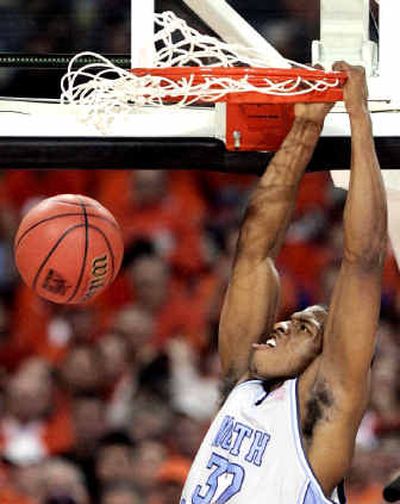Difference maker

ST. LOUIS – Rashad McCants likes to jot messages on his sneakers. “LOCK UP” – a reminder to play hard at the defensive end. “Burgess RIP” – in memory of a North Carolina academic counselor who died last year. “V.C.” – a tribute to Vince Carter, his favorite player growing up.
These impromptu musings are just another idiosyncrasy for the talented but sometimes exasperating McCants, who has helped lead the Tar Heels into tonight’s NCAA championship game against Illinois.
“It’s something to keep me motivated on the court,” McCants said Sunday. “I can just look down at my shoes.”
Looking for controversy? Look no farther than McCants, a 6-foot-4 junior guard who’s landed in plenty of hot water during his three years at North Carolina.
He’s been labeled as selfish – a guy who only worries about his own stats. He’s endured criticism for talking too much – bluntly comparing the college basketball experience to being in jail. He’s sparred with coaches and the media – struggling to understand why he keeps winding up in the center of the storm.
“You guys make it kind of tough sometimes,” McCants told reporters.
How?
“By asking horrendous questions,” he replied.
Coach Roy Williams has fumed at McCants from time to time for putting up silly shots or failing to dive after loose balls. Then again, Williams insists that he gets along just fine with the enigmatic player – and doesn’t understand why he gets chastised so much.
“It’s not fair,” Williams said. “He’s brought some of it on. But I tell you what, it’s the most unfair rap that I’ve ever seen around a player.”
During a Sunday news conference with Williams and six of his players, McCants slouched down in his seat, barely visible between teammates Sean May and Jawad Williams despite gaudy diamonds in each ear. When the inevitable question came up – so, Coach, what is the relationship like? – McCants threw his head back and stared at the ceiling.
“He has been the most scrutinized player that I’ve ever worked with,” Roy Williams said. “And yet, when I sat down with him in the spring and told him three things I wanted him to do, he’s done every single one of those. … We wouldn’t be here today without Rashad playing the way he plays.”
Williams then turned to his player.
“How did I do, Rashad?” the coach asked.
McCants responded with a thumbs up.
This season’s numbers back up Williams’ assessment. McCants has taken 92 fewer shots than he did a year ago. His scoring average has dipped from 20 points a game to 16.1. His assists are up from 2.2 to 2.7. His turnovers are down from 2.6 to 1.9.
In the regional final, McCants came up with the biggest play of the game – at the defensive end, no less. With 2 1/2 minutes remaining, he leaped outside to block a tying 3-point attempt by Wisconsin’s Clayton Hanson, who already had made five shots beyond the arc.
North Carolina held on for an 88-82 victory.
“He’s a much better total basketball player than he was last year,” Williams said.
While the Tar Heels are the highest-scoring team in the country and have five players in double figures, Illinois knows that it can’t let McCants get too many open looks at the basket.
“We’ve got to limit his touches,” Illinois guard Deron Williams said. “We’ve got to make things difficult for him. We can’t let him get into his comfort zone.”
McCants has struggled to find his comfort zone in life.
This season, he’s had the stress of his mother battling breast cancer, which may have contributed to an intestinal disorder that sidelined McCants for four games. Brenda Muckelvene already had two surgeries and will need another shortly after the Final Four, but she expects to beat the disease.
McCants hasn’t decided whether he will return for his senior season or go on to the NBA. Maybe he’ll come back to spend a year with his sister, Rashanda, who was North Carolina’s high school player of the year and will play next season for the Tar Heels.
But that’s a decision for another day.
“All that stuff is really irrelevant right now,” McCants said. “Right now, we’re here to play for a national championship.”